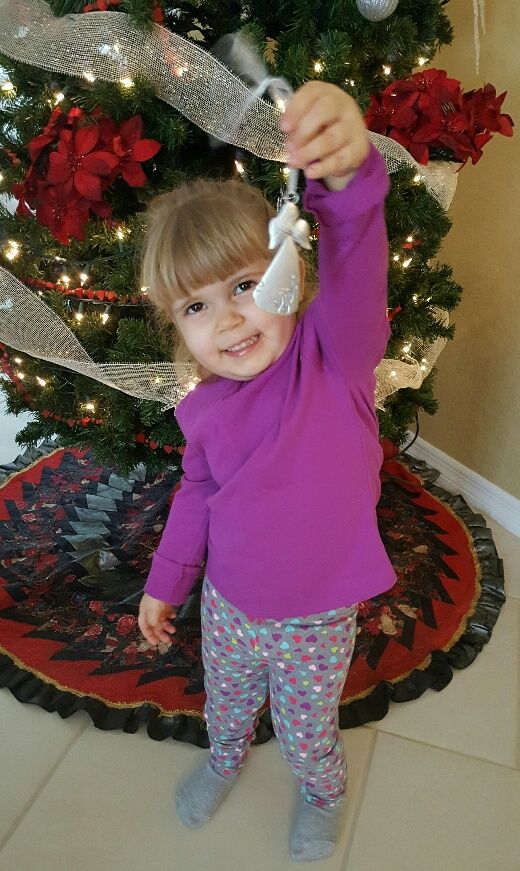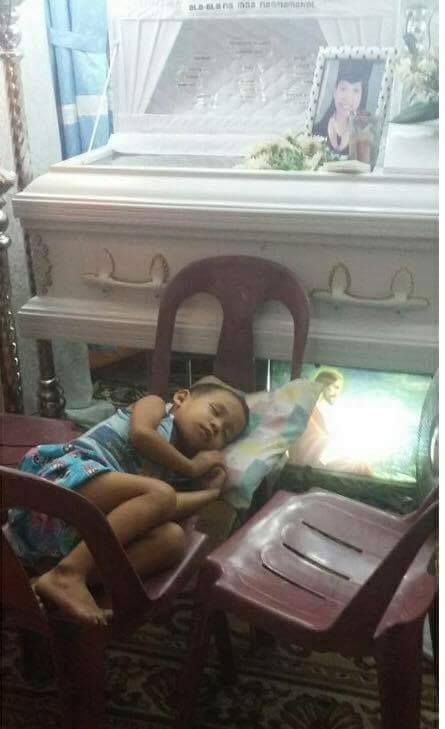
December 18th, 2016
Start a New Holiday Tradition with Your Toddler to Celebrate Their Loved One!
Losing a parent to death is difficult for a young child, losing a parent near the holidays can be especially hard as they get older. Starting a new holiday tradition can be healing for your toddler. What better way to celebrate your child's loved one then creating a tradition that will carry on for years to come!
Our granddaughter lost her mother at the age of twenty-three months and still has vivid memories of her! Like a magician pulling a rabbit out of his hat, she pulls out memories that really happened! Validating her memories is like playing a game of monopoly, she rolls the dice, we count together and she moves spaces ahead!
Starting a new holiday tradition allows her to remember and celebrate her mother during the holiday season. Since our daughter loved angels, it seemed only appropriate that each year during the Christmas season, we add a new angel to the Christmas tree in honor of Bella's mommy.
There are many traditions you can start on your own, be creative, if your child is older, ask them for suggestions! If your child's loved one enjoyed spending time at the beach, perhaps you start a shell collection and make a special lamp filled with beautiful seashells. If your child's loved one enjoyed gardening, a beautiful memory garden can be very healing! Throw in some butterfly attracting plants and watch your garden come to life!
The bottom line is this, by starting a new tradition you will allow for a dialog to discuss the emotions your little one is feeling that will move them forward in their healing.
November 12, 2016
Validation
-If my toddler brings up a past memory of their loved one, should I validate their concerns?
Absolutely! When your grieving toddler brings up a past memory of their loved one, they are looking for validation. Even at this young age, they are looking for answers. Their memory is foggy-- like a dream, "Did that really happen?"
Our granddaughter lost her mother when she was just twenty-three months old. Nearly ten months later when driving down the road, out of the blue she says, "I miss sleeping with my mommy." Catching me completely off guard, I quickly say to her "Yes, you and mommy loved snuggling together!" She nods her head with acceptance and quickly moves onto talking about something else. Helping your toddler to validate their memories helps them to move forward in their healing. When you ignore their memories, you are ignoring their pain, this could lead to other issues, later down the road.

October 3, 2016
DO TODDLERS GRIEVE TOO?
YOU BETCHA THEY DO!
Some believe that young children do not have the ability to understand death and therefore do not grieve. Although they may not understand "death", they most definitely feel the confusion, sadness and emptiness that it leaves behind. "Where's my mommy?" Often times people ignore the signs of a grieving toddler, chocking them up to the "terrific twos" but this could lead to "silent suffering" and a
confused tot dealing with sadness the only way he can, acting out in ways that may mimic normal toddler behavior, but only worse.
Some believe that young children do not have the ability to understand death and therefore do not grieve. Although they may not understand "death", they most definitely feel the confusion, sadness and emptiness that it leaves behind. "Where's my mommy?" Often times people ignore the signs of a grieving toddler, chocking them up to the "terrific twos" but this could lead to "silent suffering" and a
confused tot dealing with sadness the only way he can, acting out in ways that may mimic normal toddler behavior, but only worse.
This four year old boy takes comfort, resting alongside of his mother's coffin. He may not fully understand that her body is dead, perhaps he believes that she is sleeping. But none the less, he is
missing his mother and so his grieving begins.
Bereavement counseling is so important, finding a therapist your toddler feels comfortable with is key. The techniques used in therapy for a toddler may be different than what an older child would receive. Your toddler would be receiving therapy in the form of “play”. That's right, sitting on the floor and playing. A therapist can learn a lot about a child, simply by observing them through playtime!
missing his mother and so his grieving begins.
Bereavement counseling is so important, finding a therapist your toddler feels comfortable with is key. The techniques used in therapy for a toddler may be different than what an older child would receive. Your toddler would be receiving therapy in the form of “play”. That's right, sitting on the floor and playing. A therapist can learn a lot about a child, simply by observing them through playtime!
Some of the "new behaviors" you may experience with your grieving toddler are separation anxiety, and I don't mean the kind you experience when you drop them off at daycare, I'm talking about not
being able to visit the bathroom privately without your little one tagging along, or cooking dinner with them glued to your hip. In our case, when our granddaughter's mother left, she never came back, so I
can imagine in the young developing mind of a two year old, they don't feel "safe" allowing you to leave their sight, and understandably so!
Sleeping habits may change too, our granddaughter experiences occasional nightmares and calling out to her mommy. Don't miss this opportunity to show your toddler he is "safe".. A simple hug and a
soft "I Love You", go along way!
Don't hide the photos and become silent every time your toddler enters the room! Ignoring your toddlers "new normal", doesn't take their pain away. Keeping those random photos out in the open, allows an opportunity for your toddler to open up and communicate with you. Our granddaughter will come to us and ask to see pictures of her mommy, this gives us an opportunity to share a memory with her about her mother, perhaps how she used to sing and dance with her or maybe a trip to the park, where they played on the slide.
One of the most difficult things we encountered was the biting. Sure, all toddlers bite, after all, it's a way to communicate when their verbal skills aren't quite up to par. But our granddaughter started biting herself, leaving bruises on her fore arm and hand. Bereavement counseling taught us how to work with our granddaughter on her "emotions". When a toddler is not verbal, teaching them to understand their emotions is so very important, I can't stress this enough! “Oh, I can see that you are mad... or even when things are good... “Joey is laughing, he is happy!” Redirection is probably the best tool we have learned. Driving down the road, our toddler has her arm hanging out of her mouth.. “Oh, wow... did you see that bird fly by your window?” Redirecting, quickly gets the attention of a toddler without letting on that you acknowledged the biting. Calling them out on the negative behavior or scolding them will only encourage this behavior for negative attention. Look at redirection as a detour.
The bottom line? Yes, toddlers do grieve, just because they are young, don't think for a split second that these little people don't experience the same emotions as we do. Getting your toddler into counseling is the beginning of their healing journey.

